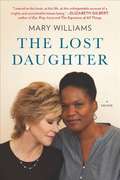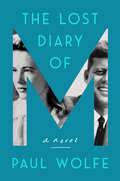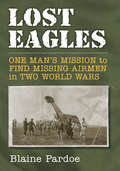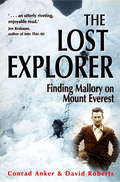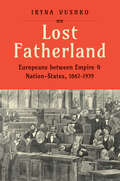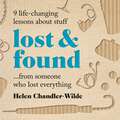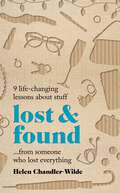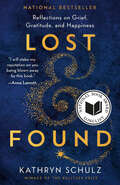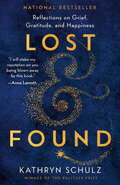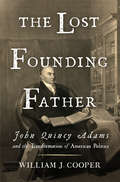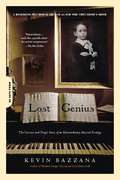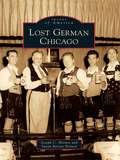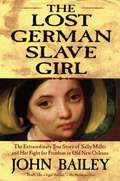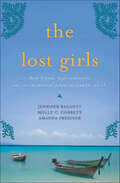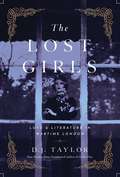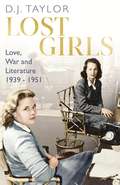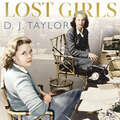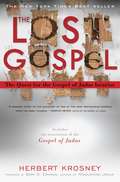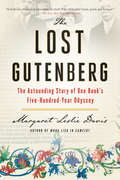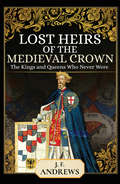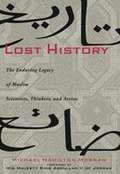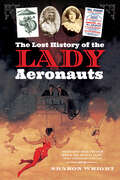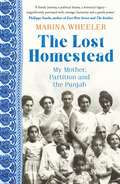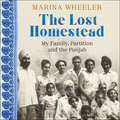- Table View
- List View
The Lost Daughter
by Mary WilliamsA daughter of the Black Panther movement tells her remarkable life story of being raised amid violence and near-poverty, adopted as a teenager by Jane Fonda, and finding her way back home. As she grew up in 1970s Oakland, California, role models for Mary Williams were few and far between: her father was often in prison, her older sister was a teenage prostitute, and her hot-tempered mother struggled to raise six children alone. When Mary was thirteen, a silver lining appeared in her life: she was invited to spend a summer at Laurel Springs Children's Camp, run by Jane Fonda and her then husband, Tom Hayden. Mary flourished at camp, and over the course of several summers, she began confiding in Fonda about her difficulties at home. During one school year, Mary suffered a nightmare assault crime, which she kept secret until she told a camp counselor and Fonda. After providing care and therapy for Mary, Fonda invited her to come live with her family. Practically overnight, Mary left the streets of Oakland for the star-studded climes of Santa Monica. Jane Fonda was the parent Mary had never had--outside the limelight and Hollywood parties, Fonda was a wonderful mom who helped with homework, listened to adolescent fears, celebrated achievements, and offered inspiration and encouragement at every turn. Mary's life since has been one of adventure and opportunity--from hiking the Appalachian Trail solo, working with the Lost Boys of Sudan, and living in the frozen reaches of Antarctica. Her most courageous trip, though, involved returning to Oakland and reconnecting with her biological mother and family, many of whom she hadn't seen since the day she left home. The Lost Daughter is a chronicle of her journey back in time, an exploration of fractured family bonds, and a moving epic of self-discovery.
The Lost Diary of M: A Novel
by Paul WolfeAn engrossing debut novel that cannily reimagines the extraordinary life and mysterious death of bohemian Georgetown socialite Mary Pinchot Meyer— secret lover of JFK, ex-wife of a CIA chief, sexual adventurer, LSD explorer and early feminist living by her own rules.She was a longtime lover of JFK.She was the ex-wife of a CIA chief. She was the sister-in-law of the Washington Post’s Ben Bradlee.She believed in mind expansion and took LSD with Timothy Leary. She was a painter, a socialite and a Bohemian in Georgetown during the Cold War.And she ended up dead in an unsolved murder a year after JFK’s assassination.The diary she kept was never found.Until now. . . .
Lost Eagles: One Man's Mission to Find Missing Airmen in Two World Wars
by Blaine PardoePraise forLost Eagles "The pilot and observer stories selected have not previously seen much exposure. Not only are they interesting, but I found myself relishing getting to the next chapter to find out what Frederick Zinn was doing during the next stage of his life. " ---Alan Roesler, founding member, League of World War I Aviation Historians, and former Managing Editor,Over the Front Praise for Blaine Pardoe's previous military histories (which average 4. 5-star customer reviews on Amazon. com): Terror of the Autumn Skies: The True Story of Frank Luke, America's Rogue Ace of World War I "This painstaking biography of World War I ace Frank Luke will earn Pardoe kudos . . . Pardoe has flown a very straight course in researching and recounting Luke's myth-ridden life. . . . Thorough annotation makes the book that much more valuable to WWI aviation scholars as well as for more casual air-combat buffs. " ---Booklist The Cruise of the Sea Eagle: The Amazing True Story of Imperial Germany's Gentleman Pirate "This is a gem of a story, well told, and nicely laid out with photos, maps, and charts that cleverly illuminate the lost era of 'gentlemen pirates' at sea . . . [German commerce raider Felix von Luckner's] legend lives on in this lively and readable biography. " ---Admiral James Stavridis, U. S. Navy, Naval History Few people have ever heard of Frederick Zinn, yet even today airmen's families are touched by this man and the work he performed in both world wars. Zinn created the techniques still in use to determine the final fate of airmen missing in action. The last line of the Air Force Creed reads, "We will leave no airman behind. " Zinn made that promise possible. Blaine Pardoe weaves together the complex story of a man who brought peace and closure to countless families who lost airmen during both world wars. His lasting contribution to warfare was a combination of his methodology for locating the remains of missing pilots (known as the Zinn system) and his innovation of imprinting all aircraft parts with the same serial number so that if a wreck was located, the crewman could be identified. The tradition he established for seeking and recovering airmen is carried on to this day. Blaine Pardoe is an accomplished author who has published dozens of military fiction novels and other books, including the widely acclaimedCubicle Warfare: Self-Defense Tactics for Today's Hypercompetitive Workplace;Terror of the Autumn Skies: The True Story of Frank Luke, America's Rogue Ace of World War I;andThe Cruise of the Sea Eagle: The Amazing True Story of Imperial Germany's Gentleman Pirate. Jacket photo: Frederick Zinn's Sopwith aircraft, which crashed during World War I. National Museum of the United States Air Force Archives.
The Lost Explorer: Finding Mallory on Mount Everest
by Conrad Anker David RobertsIn 1999, Conrad Anker found the body of George Mallory on Mount Everest, casting an entirely new light on the mystery of the lost explorer.On 8 June 1924, George Leigh Mallory and Andrew 'Sandy' Irvine were last seen climbing towards the summit of Everest. The clouds closed around them and they were lost to history, leaving the world to wonder whether or not they actually reached the summit - some 29 years before Edmund Hillary and Tensing Norgay.On 1 May 1999, Conrad Anker, one of the world's foremost mountaineers, made the momentous discovery - Mallory's body, lying frozen into the scree at 27,000 feet on Everest's north face. Recounting this day, the authors go on to assess the clues provided by the body, its position, and the possibility that Mallory had successfully climbed the Second Step, a 90-foot sheer cliff that is the single hardest obstacle on the north face. A remarkable story of a charming and immensely able man, told by an equally talented modern climber.
Lost Fatherland: Europeans between Empire and Nation-States, 1867-1939
by Iryna VushkoHow the demise of the Habsburg Empire, postwar sovereignty, and new diplomatic frontiers shaped the nature of citizenship, identity, and belonging across Europe This book is a collective portrait of twenty-one key statesmen who came of age during the Habsburg Empire. They include the cofounder of Austro-Marxism and the Austrian republic&’s first foreign minister, the cofounder of the European Union after the Second World War, the founder of the Communist Party of Czechoslovakia, and Mussolini&’s ambassador to Vienna. Some survived the First World War and the resulting geographical divisions in their homelands, and some went on to serve in politics and governments throughout Europe. Taken together, the stories of these men offer readers a window on broad issues of European history in the late nineteenth and early twentieth centuries—chiefly, how an imperial heritage, a shared vision of statehood and nationalism, and a commitment to peaceful conflict resolution helped establish enduring loyalty and unity despite the geographical fault lines resulting from the war. As Iryna Vushko explains, their stories also offer an increasingly nuanced understanding of the achievements and failures of the Habsburg Empire.
Lost & Found: 9 life-changing lessons about stuff from someone who lost everything
by Helen Chandler-WildeAn exploration into why we keep holding on to material things and what they mean to usOn New Year's Eve of 2018, journalist Helen Chandler-Wilde lost everything she owned in a storage unit fire in Croydon, where she'd stowed all her possessions after a big break-up. She was left devastated, and forced to re-evaluate her relationship with owning material things. A mix of memoir, self-help and journalism, Lost & Found explores the psychological reasons for why we buy and keep the things we do, and explains how we can liberate ourselves from the tyranny of 'too much'. Helen interviews people from all walks of life, including behavioural psychologists on the science of nostalgia, a nun on what it's like to own almost nothing and consumer psychologists on why we spend impulsively, to help us better understand why we're surrounded by clutter and what we can do to change it.This smart-thinking book explains the sociological quirks of human nature and the fascinating science behind why we buy and hold onto things. By the end of it, your relationship with your belongings will be changed forever.
Lost & Found: 9 life-changing lessons about stuff from someone who lost everything
by Helen Chandler-WildeAn exploration into why we keep holding on to material things and what they mean to usOn New Year's Eve of 2018, journalist Helen Chandler-Wilde lost everything she owned in a storage unit fire in Croydon, where she'd stowed all her possessions after a big break-up. She was left devastated, and forced to re-evaluate her relationship with owning material things. A mix of memoir, self-help and journalism, Lost & Found explores the psychological reasons for why we buy and keep the things we do, and explains how we can liberate ourselves from the tyranny of 'too much'. Helen interviews people from all walks of life, including behavioural psychologists on the science of nostalgia, a nun on what it's like to own almost nothing and consumer psychologists on why we spend impulsively, to help us better understand why we're surrounded by clutter and what we can do to change it.This smart-thinking book explains the sociological quirks of human nature and the fascinating science behind why we buy and hold onto things. By the end of it, your relationship with your belongings will be changed forever.
Lost & Found: A Memoir
by Kathryn SchulzAn enduring account of joy and sorrow from one of the great writers of our time, The New Yorker&’s Kathryn Schulz, winner of the Pulitzer Prize&“Our lives do indeed deserve and reward the kind of honest, gentle, brilliant scrutiny Schulz brings to bear on her own life. The book is profound and beautiful.&”—Marilynne Robinson, author of Housekeeping and GileadONE OF THE MOST ANTICIPATED BOOKS OF 2022—Oprah Daily, The Washington Post, Vogue, The Philadelphia Inquirer, Esquire, Chicago Review of Books, Town & Country, Electric Lit, The Rumpus, Lit HubEighteen months before Kathryn Schulz&’s beloved father died, she met the woman she would marry. In Lost & Found, she weaves the stories of those relationships into a brilliant exploration of how all our lives are shaped by loss and discovery—from the maddening disappearance of everyday objects to the sweeping devastations of war, pandemic, and natural disaster; from finding new planets to falling in love.Three very different American families form the heart of Lost & Found: the one that made Schulz&’s father, a charming, brilliant, absentminded Jewish refugee; the one that made her partner, an equally brilliant farmer&’s daughter and devout Christian; and the one she herself makes through marriage. But Schulz is also attentive to other, more universal kinds of conjunction: how private happiness can coexist with global catastrophe, how we get irritated with those we adore, how love and loss are themselves unavoidably inseparable. The resulting book is part memoir, part guidebook to living in a world that is simultaneously full of wonder and joy and wretchedness and suffering—a world that always demands both our gratitude and our grief.A staff writer at The New Yorker and winner of the Pulitzer Prize, Kathryn Schulz writes with curiosity, tenderness, erudition, and wit about our finite yet infinitely complicated lives. Crafted with the emotional clarity of C. S. Lewis and the intellectual force of Susan Sontag, Lost & Found is an uncommon book about common experiences.
Lost & Found: Reflections on Grief, Gratitude, and Happiness
by Kathryn SchulzA Pulitzer Prize-winning New Yorker writer tells the story of losing her father and finding the love of her life in this profound meditation on grief and joy.Eighteen months before her beloved father died, Kathryn met Casey, the woman who would become her wife. Lost & Found weaves together their love story with Kathryn's story of losing her father in a brilliant exploration of the way families are lost and found and the ways life dispenses wretchedness and suffering, beauty and grandeur all at once. So much has been written about loss--and Schulz writes with painful clarity about the vicissitudes of grieving her father--but here she writes about the vital phenomenon of finding.The book is organized into three parts: "Lost," which explores the sometimes comic, sometimes frustrating, sometimes heartbreaking experience of losing things, grounded in Kathryn's account of her father's death; "Found," which examines the experience of discovery, from new ideas to new planets, grounded in her story of falling in love; and finally, "And," which contends with the way these events happen in conjunction and imply the inevitable: life keeps going on, not only around us but beyond us and after us. Kathryn Schulz has the ability to measure the depth and breadth of human experience with unusual exactness--she articulates the things all of us feel but have been unable to put into language. Lost & Found is a work of philosophical interrogation as well as a story about life, death and the discovery of one great love just as another is being lost.
The Lost Founding Father: John Quincy Adams And The Transformation Of American Politics
by William J. CooperWhy has John Quincy Adams been largely written out of American history when he is, in fact, our lost Founding Father? Long relegated to the sidelines of history as the hyperintellectual son of John and Abigail Adams, John Quincy Adams (1767–1848), has never basked in the historical spotlight. Remembered, if at all, as an ineffective president during an especially rancorous time, Adams was humiliated in office after the contested election of 1824, viciously assailed by populist opponents for being both slippery and effete, and then resoundingly defeated by the western war hero Andrew Jackson, whose 1828 election ushered in an era of unparalleled expansion. Aware of this reputation yet convinced that Adams deserves a reconsideration, award-winning historian William J. Cooper has reframed the sixth president’s life in an entirely original way, demonstrating that Adams should be considered our lost Founding Father, his morality and political philosophy the final link to the great visionaries who created our nation. As Cooper demonstrates, no one else in his generation—not Clay, Webster, Calhoun, or Jackson—ever experienced Europe as young Adams did, who at fourteen translated from French at the court of Catherine the Great. In fact, Adams’s very exposure to the ideas of the European Enlightenment that had so influenced the Founding Fathers, including their embrace of reason, were hardly shared by his contemporaries, particularly those who could not countenance slaves as equal human beings. Such differences, as Cooper narrates, became particularly significant after Adams’s failed presidency, when he, along with his increasingly reclusive wife, Louisa Catherine Adams, returned to Washington as a Massachusetts congressman in 1831. With his implacable foe Andrew Jackson in the White House, Adams passionately took up the antislavery cause. Despite raucous opposition from southern and northern politicians, Adams refused to relent, his protests so vehement that Congress enacted the gag rule in the 1830s specifically to silence him. With his impassioned public pronouncements and his heroic arguments in the Amistad trial, a defiant Adams was no longer viewed as a failed president but a national, albeit curmudgeonly, hero, who finally collapsed on the floor of the House chamber in 1848 and died in the capital three days later. Ironically, Adams’s death and the extraordinary obsequies produced an outpouring of national, and bipartisan, grief never before seen in the nineteenth century, as if the country had truly lost its last Founding Father. Now, in another fractious age, the courageous life of John Quincy Adams suddenly takes on renewed vigor and meaning, as William J. Cooper’s momentous biography so eloquently affirms.
Lost Genius: The Curious and Tragic Story of an Extraordinary Musical Prodigy
by Kevin BazzanaBorn in 1903, pianist Ervin Nyiregyházi was the subject of the first book devoted to the scientific study of a single prodigy. By twenty-five he had all but disappeared. Mismanaged, exploited, and unfashionably romantic, his career floundered in adulthood. He drank heavily, married ten times, and was reduced to penury, sometimes living on the subway. He settled in Los Angeles where he performed sporadically, counting many of Holly-wood's elite among his friends, including Gloria Swanson, a likely lover. Rediscovered in the 1970s, he enjoyed a sensational and controversial renaissance, before slipping back into obscurity.
Lost German Chicago (Images of America)
by Joseph C. Heinen Susan Barton HeinenBy 1900, one in four Chicagoans was either German born or had a German-born parent. No other ethnic group's thumbprint has been larger in helping establish Chicago as a major economic and cultural center nor has any group's influence been more erased by the passage and vicissitudes of time. Lost German Chicago traces the mosaic of German life through the tumultuous events of the Beer Riots, Haymarket Affair, Prohibition, and America's entry into two world wars. The book is a companion piece to the Lost German Chicago exhibition debuting in the newly created DANK-Haus German American Cultural Center museum, located in what is still known today as the "German town" of the north side of Chicago. Entrusted as the caretaker of many archives, artifacts, and historical documents from many now defunct German organizations, the DANK-Haus German American Cultural Center has been committed to preserving history, traditions, and contributions of Germans and German Americans for over 50 years.
The Lost German Slave Girl: The Extraordinary True Story Of The Slave Sally Miller And Her Fight For Freedom In Old New Orleans
by John BaileyIt is a spring morning in New Orleans, 1843. In the Spanish Quarter, on a street lined with flophouses and gambling dens, Madame Carl recognizes a face from her past. It is the face of a German girl, Sally Miller, who disappeared twenty-five years earlier. But the young woman is property, the slave of a nearby cabaret owner. She has no memory of a "white" past. Yet her resemblance to her mother is striking, and she bears two telltale birthmarks. In brilliant novelistic detail, award-winning historian John Bailey reconstructs the exotic sights, sounds, and smells of mid-nineteenth-century New Orleans, as well as the incredible twists and turns of Sally Miller's celebrated and sensational case. Did Miller, as her relatives sought to prove, arrive from Germany under perilous circumstances as an indentured servant or was she, as her master claimed, part African, and a slave for life? A tour de force of investigative history that reads like a suspense novel, The Lost German Slave Girl is a fascinating exploration of slavery and its laws, a brilliant reconstruction of mid-nineteenth-century New Orleans, and a riveting courtroom drama. It is also an unforgettable portrait of a young woman in pursuit of freedom.
The Lost Girls: Three Friends. Four Continents. One Unconventional Detour Around the World.
by Jennifer Baggett Holly C. Corbett Amanda Pressner“A triumphant journey about losing yourself, finding yourself and coming home again. Hitch yourself to their ride: you’ll embark on a transformative journey of your own.” — Allison Winn Scotch, New York Times bestselling author of The One That I Want and Time of My LifeThree friends, each on the brink of a quarter-life crisis, make a pact to quit their high pressure New York City media jobs and leave behind their friends, boyfriends, and everything familiar to embark on a year-long backpacking adventure around the world in The Lost Girls.With their thirtieth birthdays looming, Jen, Holly, and Amanda are feeling the pressure to hit certain milestones—score the big promotion, find a soul mate, have 2.2 kids. Instead, they make a pact to quit their jobs and set out on a journey in search of inspiration and direction.Traveling 60,000 miles across four continents, Jen, Holly, and Amanda push themselves far outside their comfort zones to embrace every adventure. Ultimately, theirs is a story of true friendship—a bond forged by sharing beds and backpacks, enduring exotic illnesses, trekking across mountains, and standing by one another through heartaches, whirlwind romances, and everything in the world in between.
The Lost Girls: Love And Literature In Wartime London
by D. J. TaylorThe Booker Prize–nominated author of Derby Day delivers a sumptuous cultural history as seen through the lives of four enigmatic women. Who were the Lost Girls? Chic, glamorous, and bohemian, as likely to be found living in a rat-haunted maisonette as dining at the Ritz, Lys Lubbock, Sonia Brownell, Barbara Skelton, and Janetta Parlade cut a swath through English literary and artistic life at the height of World War II. Three of them had affairs with Lucian Freud. One of them married George Orwell. Another became the mistress of the King of Egypt. They had very different—and sometimes explosive—personalities, but taken together they form a distinctive part of the wartime demographic: bright, beautiful, independent-minded women with tough upbringings who were determined to make the most of their lives in a chaotic time. Ranging from Bloomsbury and Soho to Cairo and the couture studios of Schiaparelli and Hartnell, the Lost Girls would inspire the work of George Orwell, Evelyn Waugh, Anthony Powell, and Nancy Mitford. They are the missing link between the Lost Generation and Bright Young People and the Dionysiac cultural revolution of the 1960s. Sweeping, passionate, and unexpectedly poignant, this is their untold story.
Lost Girls: Love, War and Literature: 1939-51
by D.J. TaylorA Times Book of the Year 2019'You should not deny yourself the pleasure of reading it' Sunday Times'A remarkable work and an important addition to the extraordinary wartime history of literary London' Literary ReviewWho were the Lost Girls? At least a dozen or so young women at large in Blitz-era London have a claim to this title. But Lost Girls concentrates on just four: Lys Lubbock, Sonia Brownell, Barbara Skelton and Janetta Parlade. Chic, glamorous and bohemian, as likely to be found living in a rat-haunted maisonette as dining at the Ritz, they cut a swathe through English literary and artistic life in the 1940s. Three of them had affairs with Lucian Freud. One of them married George Orwell. Another became the mistress of the King of Egypt and was flogged by him on the steps of the Royal Palace. And all of them were associated with the decade's most celebrated literary magazine, Horizon, and its charismatic editor Cyril Connolly. Lys, Sonia, Barbara and Janetta had very different - and sometimes explosive personalities - but taken together they form a distinctive part of the war-time demographic: bright, beautiful, independent-minded women with tough upbringings behind them determined to make the most of their lives in a highly uncertain environment. Theirs was the world of the buzz bomb, the cocktail party behind blackout curtains, the severed hand seen on the pavement in the Bloomsbury square, the rustle of a telegram falling through the letter-box, the hasty farewell to another half who might not ever come back, a world of living for the moment and snatching at pleasure before it disappeared. But if their trail runs through vast acreages of war-time cultural life then, in the end, it returns to Connolly and his amorous web-spinning, in which all four of them regularly featured and which sometimes complicated their emotional lives to the point of meltdown.The Lost Girls were the product of a highly artificial environment. After it came to an end - on Horizon's closure in 1950 - their careers wound on. Later they would have affairs with dukes, feature in celebrity divorce cases and make appearances in the novels of George Orwell, Evelyn Waugh, Anthony Powell and Nancy Mitford. The last of them - Janetta - died as recently as three months ago. However tiny their number, they are a genuine missing link between the first wave of newly-liberated young women of the post-Great War era and the Dionysiac free-for-all of the 1960s. Hectic, passionate and at times unexpectedly poignant, this is their story.
Lost Girls: Love, War and Literature: 1939-51
by D.J. TaylorA Times Book of the Year 2019'You should not deny yourself the pleasure of reading it' Sunday Times'A remarkable work and an important addition to the extraordinary wartime history of literary London' Literary ReviewWho were the Lost Girls? At least a dozen or so young women at large in Blitz-era London have a claim to this title. But Lost Girls concentrates on just four: Lys Lubbock, Sonia Brownell, Barbara Skelton and Janetta Parlade. Chic, glamorous and bohemian, as likely to be found living in a rat-haunted maisonette as dining at the Ritz, they cut a swathe through English literary and artistic life in the 1940s. Three of them had affairs with Lucian Freud. One of them married George Orwell. Another became the mistress of the King of Egypt and was flogged by him on the steps of the Royal Palace. And all of them were associated with the decade's most celebrated literary magazine, Horizon, and its charismatic editor Cyril Connolly. Lys, Sonia, Barbara and Janetta had very different - and sometimes explosive personalities - but taken together they form a distinctive part of the war-time demographic: bright, beautiful, independent-minded women with tough upbringings behind them determined to make the most of their lives in a highly uncertain environment. Theirs was the world of the buzz bomb, the cocktail party behind blackout curtains, the severed hand seen on the pavement in the Bloomsbury square, the rustle of a telegram falling through the letter-box, the hasty farewell to another half who might not ever come back, a world of living for the moment and snatching at pleasure before it disappeared. But if their trail runs through vast acreages of war-time cultural life then, in the end, it returns to Connolly and his amorous web-spinning, in which all four of them regularly featured and which sometimes complicated their emotional lives to the point of meltdown.The Lost Girls were the product of a highly artificial environment. After it came to an end - on Horizon's closure in 1950 - their careers wound on. Later they would have affairs with dukes, feature in celebrity divorce cases and make appearances in the novels of George Orwell, Evelyn Waugh, Anthony Powell and Nancy Mitford. The last of them - Janetta - died as recently as three months ago. However tiny their number, they are a genuine missing link between the first wave of newly-liberated young women of the post-Great War era and the Dionysiac free-for-all of the 1960s. Hectic, passionate and at times unexpectedly poignant, this is their story.
The Lost Gospel: The Quest for the Gospel of Judas Iscariot
by Herbert KrosneyA writer and documentary filmmaker based in New York and Jerusalem, Krosney describes how Egyptian peasants discovered a bound papyrus book in Coptic near the Nile in the middle to late 1970s that was identified in 2000 as the Gospel of Judas Iscariot, which was mentioned by some early Christians but condemned 1,800 years ago. It has been radio-carbon dated at 220-340 +/- 60 years. He includes quotations from the text, but the text itself was published as The Gospel of Judas (ISBN 1-4262-0042-0), which was the first modern translation of the ancient Coptic document. Annotation ©2007 Book News, Inc. , Portland, OR (booknews. com)
The Lost Gutenberg: The Astounding Story of One Book's Five-Hundred-Year Odyssey
by Margaret Leslie Davis"An addictive and engaging look at the ‘competitive, catty and slightly angst-ridden’ heart of the world of book collecting.” - The Houston Chronicle The never-before-told story of one extremely rare copy of the Gutenberg Bible, and its impact on the lives of the fanatical few who were lucky enough to own it.For rare-book collectors, an original copy of the Gutenberg Bible--of which there are fewer than 50 in existence--represents the ultimate prize. Here, Margaret Leslie Davis recounts five centuries in the life of one copy, from its creation by Johannes Gutenberg, through the hands of monks, an earl, the Worcestershire sauce king, and a nuclear physicist to its ultimate resting place, in a steel vault in Tokyo. Estelle Doheny, the first woman collector to add the book to her library and its last private owner, tipped the Bible onto a trajectory that forever changed our understanding of the first mechanically printed book.The Lost Gutenberg draws readers into this incredible saga, immersing them in the lust for beauty, prestige, and knowledge that this rarest of books sparked in its owners. Exploring books as objects of obsession across centuries, this is a must-read for history buffs, book collectors, seekers of hidden treasures, and anyone who has ever craved a remarkable book--and its untold stories.
Lost Heirs of the Medieval Crown: The Kings and Queens Who Never Were
by J. F. Andrews&“A fascinating study of the also-rans and almost-made-its of medieval history . . . Beautifully written and well researched, it is an engaging read.&” —History . . . The Interesting Bits! When William the Conqueror died in 1087, he left the throne of England to William Rufus . . . his second son. The result was an immediate war as Rufus&’s elder brother Robert fought to gain the crown he saw as rightfully his; this conflict marked the start of 400 years of bloody disputes as the English monarchy&’s line of hereditary succession was bent, twisted and finally broken when the last Plantagenet king, Richard III, fell at Bosworth in 1485. The Anglo-Norman and Plantagenet dynasties were renowned for their internecine strife, and in Lost Heirs we will unearth the hidden stories of fratricidal brothers, usurping cousins and murderous uncles; the many kings—and the occasional queen—who should have been but never were. History is written by the winners, but every game of thrones has its losers too, and their fascinating stories bring richness and depth to what is a colorful period of history. King John would not have gained the crown had he not murdered his young nephew, who was in line to become England&’s first King Arthur; Henry V would never have been at Agincourt had his father not seized the throne by usurping and killing his cousin; and as the rival houses of York and Lancaster fought bloodily over the crown during the Wars of the Roses, life suddenly became very dangerous indeed for a young boy named Edmund. &“A journey through the minefield of opposing factions fighting for the crown of England.&” —Books Monthly
Lost Heirs of the Medieval Crown: The Kings and Queens Who Never Were
by J. F. Andrews&“A fascinating study of the also-rans and almost-made-its of medieval history . . . Beautifully written and well researched, it is an engaging read.&” —History . . . The Interesting Bits! When William the Conqueror died in 1087, he left the throne of England to William Rufus . . . his second son. The result was an immediate war as Rufus&’s elder brother Robert fought to gain the crown he saw as rightfully his; this conflict marked the start of 400 years of bloody disputes as the English monarchy&’s line of hereditary succession was bent, twisted and finally broken when the last Plantagenet king, Richard III, fell at Bosworth in 1485. The Anglo-Norman and Plantagenet dynasties were renowned for their internecine strife, and in Lost Heirs we will unearth the hidden stories of fratricidal brothers, usurping cousins and murderous uncles; the many kings—and the occasional queen—who should have been but never were. History is written by the winners, but every game of thrones has its losers too, and their fascinating stories bring richness and depth to what is a colorful period of history. King John would not have gained the crown had he not murdered his young nephew, who was in line to become England&’s first King Arthur; Henry V would never have been at Agincourt had his father not seized the throne by usurping and killing his cousin; and as the rival houses of York and Lancaster fought bloodily over the crown during the Wars of the Roses, life suddenly became very dangerous indeed for a young boy named Edmund. &“A journey through the minefield of opposing factions fighting for the crown of England.&” —Books Monthly
Lost History: The Enduring Legacy of Muslim Scientists, Thinkers, and Artists
by Michael Hamilton MorganIn an era when the relationship between Islam and the West seems mainly defined by mistrust and misunderstanding, it is important to remember that for centuries Muslim civilization was the envy of the world. Lost History fills a significant void and is essential reading for anyone seeking to understand the major the early Muslims played in influencing modern society. Morgan reveals how early Muslim advancements in science and culture laid the cornerstones of the European Renaissance, the Enlightenment, and modern Western society. As he chronicles the Golden Ages of Islam, beginning in A.D. 570 with the birth of Muhammad, and resonating today, he introduces scholars like Ibn Al-Haytham, Ibn Sina, Al-Tusi, Al-Khwarizmi, and Omar Khayyam, towering figures who revolutionized the mathematics, astronomy, and medicine of their time and paved the way for Newton, Copernicus, and many others. And he reminds us that inspired leaders from Muhammad to Suleiman the Magnificent and beyond championed religious tolerance, encouraged intellectual inquiry, and sponsored artistic, architectural, and literary works that still dazzle us with their brilliance. Lost History finally affords pioneering leaders with the proper credit and respect they so richly deserve.
The Lost History of the Lady Aeronauts
by Sharon Wright&“A simply brilliant history that rescues from undeserved obscurity a roster of pioneering women in the very beginning of the age of aviation.&” —Midwest Book Review From have-a-go Georgians to emancipated Edwardians, the lady aeronauts were actresses, writers, heiresses, scientists, engineers, explorers, showgirls and suffragettes. These unsung trailblazers for female freedom enjoyed lives shot through with sheer courage and joie de vivre. Yet they were all but forgotten. Hold on tight for a white-knuckle balloon ride through their remarkable real-life stories . . . &“You couldn&’t want for a better antidote to pinkness than these tales of girls and women unleashing their pluck and inventiveness in the unregulated age of balloonomania . . . This is history at its most satisfying.&” —Damesnet &“Sharon Wright tells a fabulous tale, and has uncovered some terrific stories of long forgotten heroines of the air. Some stories are comic, many are tragic, many are a bit of both, and she tells it brilliantly.&” —Bristol Post &“History has never been so much fun!&” —What&’sHerName Podcast
The Lost Homestead: My Mother, Partition and the Punjab
by Marina WheelerSHORT LISTED FOR THE 2021 CHRISTOPHER BLAND PRIZE'The Lost Homestead is a memoir of Wheeler's mother and her family, which turns out to be so much more than that... it takes the reader into the contested history of India and Pakistan in the 1940s, and explores the impact of partition and division (from the Punjab to Berlin) on the lives of individuals.' - MARY BEARD'Deeply touching.' - Daily Mail'A personal, sometimes harrowing history of partition... a writer well worth reading.' - The Times'A deeply personal story of identity and a highly relatable journey for many in the diaspora... Wheeler taps a rich vein of personal history... Evocative... Gripping.' - Financial Times'A timely read given the current reassessment of colonialism . . . a charming memoir that weaves the story of India independence and the tragedy of the partition with that of her mother's own escape from an unhappy marriage.' - Christina Lamb, Sunday Times'A personal, sometimes harrowing history of partition . . . by narrating partition with a focus on her mother's family, the Singhs, she has made the abstractions of history suddenly more real: they are given names, faces and feelings . . . offers valuable insights, especially since Gandhi and Jinnah were also products of London's inns of court . . . [Marina Wheeler is] a writer well worth reading.' - Tanjil Rashid, The Times'A family journey, a political drama, a historical legacy - magnificently portrayed with courage, humanity and a gentle power.' - Philippe Sands, author of East West Street and The Ratline'A wonderful memoir, gripping, elegant, warm and insightful - a triumph. An intimate and inspiring portrayal of how a woman made her own world as nations and empire were made and unmade.' - Dr Shruti Kapila, Lecturer in Modern History, University of Cambridge'This book is more than a family memoir - it is an insightful glimpse into the way small worlds are forever changed by the impersonal currents of history.' Shashi Tharoor, author of Inglorious Empire: What the British Did to India***On 3 June 1947, as British India descended into chaos, its division into two states was announced. For months the violence and civil unrest escalated. With millions of others, Marina Wheeler's mother Dip Singh and her Sikh family were forced to flee their home in the Punjab, never to return. As an Anglo-Indian with roots in what is now Pakistan, Marina Wheeler weave's her mother's story of loss and new beginnings, personal and political freedom into the broader, still highly contested, history of the region. We follow Dip when she marries Marina's English father and leaves India for good, to Berlin, then a divided city, and to Washington DC where the fight for civil rights embraced the ideals of Mahatma Gandhi. The Lost Homestead touches on global themes that strongly resonate today: political change, religious extremism, migration, minorities, nationhood, identity and belonging. But above all it is about coming to terms with the past, and about the stories we choose to tell about ourselves.
The Lost Homestead: My Mother, Partition and the Punjab
by Marina WheelerOn 3 June 1947, as British India descended into chaos, its division into two states was announced. For months the violence and civil unrest escalated. With millions of others, Marina Wheeler's mother Dip Singh and her Sikh family were forced to flee their home in the Punjab, never to return. Through her mother's memories, accounts from her Indian family and her own research in both India and Pakistan, she explores how the peoples of these new nations struggled to recover and rebuild their lives. As an Anglo-Indian with roots in what is now Pakistan, Marina attempts to untangle some of these threads to make sense of her own mother's experience, while weaving her family's story into the broader, still highly contested, history of the region. This is a story of loss and new beginnings, personal and political freedom. It follows Dip when she marries Marina's English father and leaves India for good, to Berlin, then a divided city, and to Washington DC where the fight for civil rights embraced the ideals of Mahatma Gandhi. The Lost Homestead touches on global themes that strongly resonate today: political change, religious extremism, migration, minorities, nationhood, identity and belonging. But above all it is about coming to terms with the past, and about the stories we choose to tell about ourselves.(P) 2019 Hodder & Stoughton Ltd
